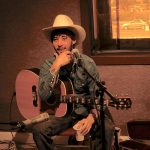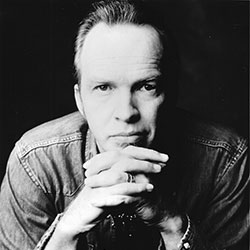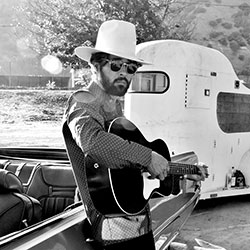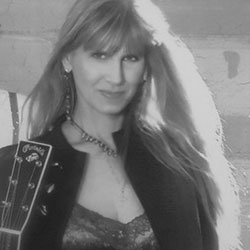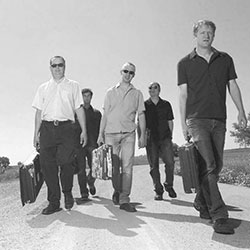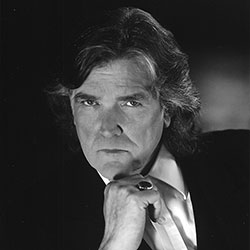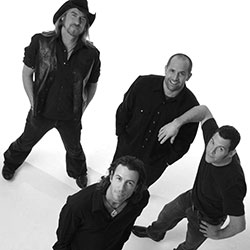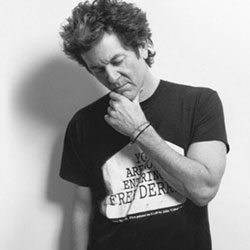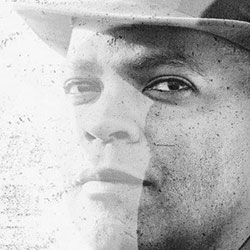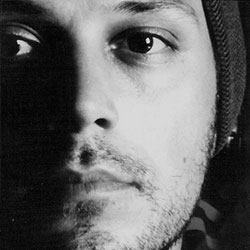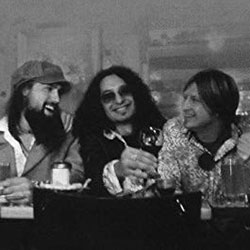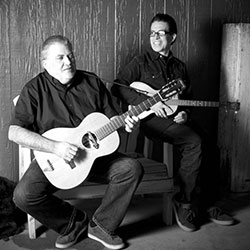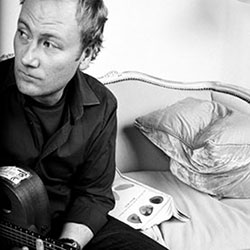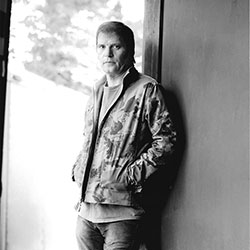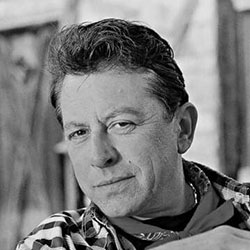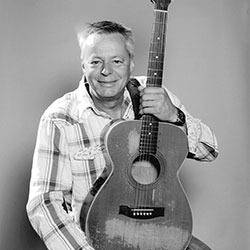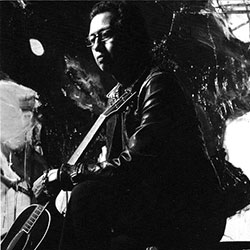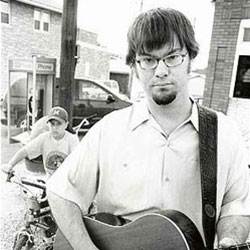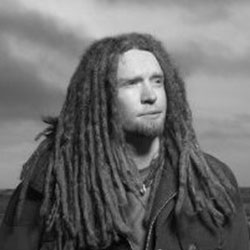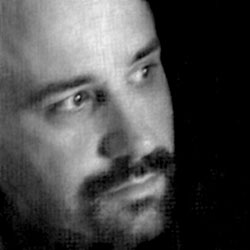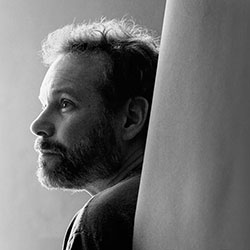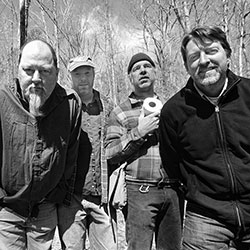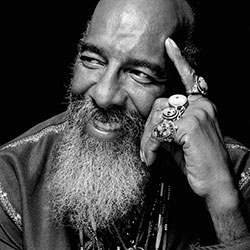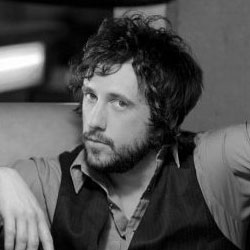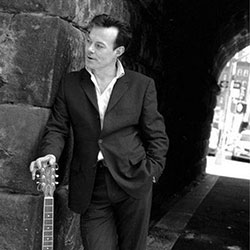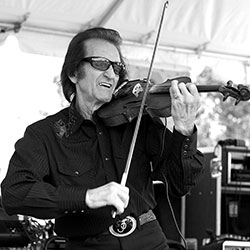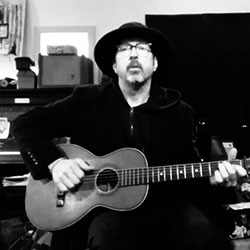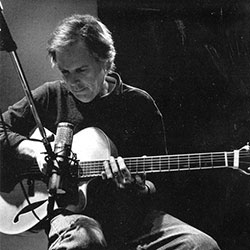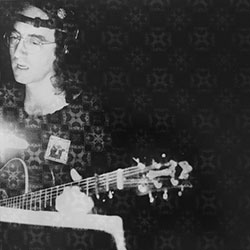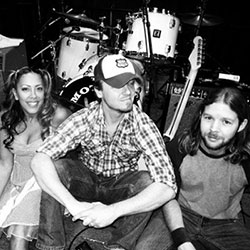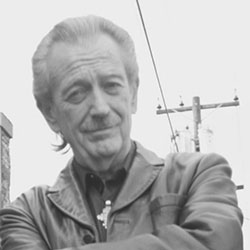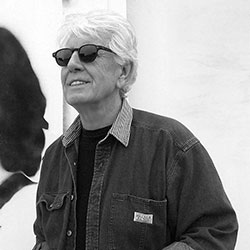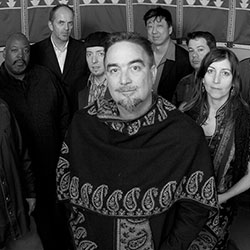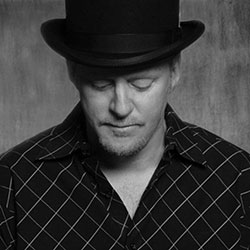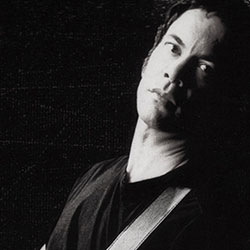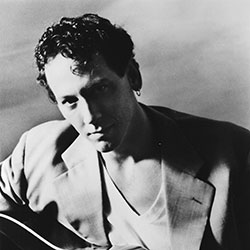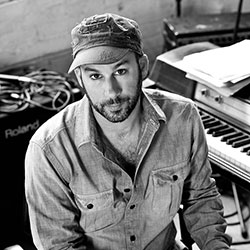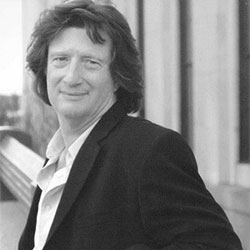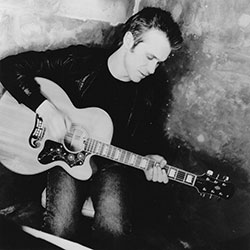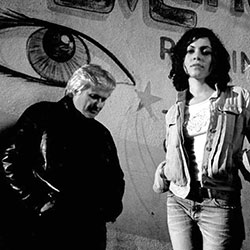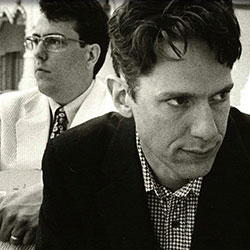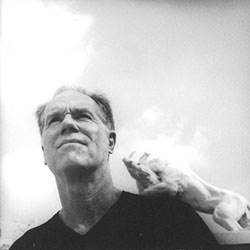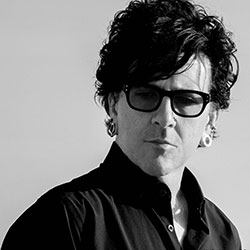KCUV radio 2003–2008
The Front Range’s reputation as an adventurous radio market dates to the early ’70s and the freeform days of KFML, a quirky, alternative, underground adventure. KBCO, which helped birth the “Triple A” (short for “adult album alternative”) programming format, and alternative-rock powerhouse KTCL carried on the tradition in their early local and independently operated days, before they became part of corporately-owned radio in the mid-’90s.
Into this competitive world of multimillion-dollar media giants, where each percentage of a ratings point is crucial, KCUV cranked up the 1510-AM transmitter in October 2003. The station unleashed a collection of roots-based music that ranged from alternative country, early R&B, blues, folk, rockabilly, bluegrass and some eclectic classic and progressive rock—the combined genres creating an Americana format. Originally dubbed “Colorado’s Underground Voice,” it received a bit of a sonic face lift on FM 102.3, adding more traditional, rock-based artists to round out its diverse format.
KCUV ceased operations in 2008, but during its five-year run, the station hosted numerous artists in its in-house studio space, with those recordings archived here by Colorado Music Experience for the enjoyment of all.
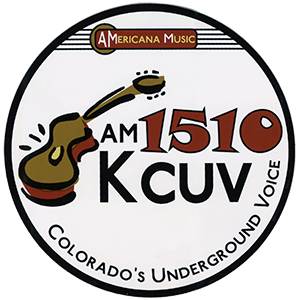
Dave Alvin
Abilene
With his brother Phil, Dave Alvin co-founded the Blasters, the seminal Los Angeles roots-rock band. After leaving the group in 1986, Alvin enjoyed a marked creative progression, as he developed his skills as a songwriter, musician and singer. “Abilene,” a song he had road-tested, concerns the dark past of a wanderer and the hope of a brighter future in the next town.
Ryan Bingham
Bread and Water
Long before his role on Yellowstone, KCUV was proud to be one of the first radio stations in the country to play Ryan Bingham’s debut studio album. Mescalito contained “Bread and Water,” a tune about life on the road as a struggling singer-songwriter—“wandering from town to town with an acoustic guitar, playing for tips, bread and water, and an occasional shot of whiskey.”
Rory Block
Me and the Devil Blues
Known among folk and blues aficionados for her encyclopedic knowledge of traditional Delta stylings, Rory Block had no red-hot-mama affectations, just an unyielding devotion to the repertoire of the old blues masters. Her rousing rendition of “Me and the Devil Blues,” first recorded by the renowned Robert Johnson in 1938, impeccably reproduces his guitar wizardry.
Camper Van Beethoven
That Gum You Like Is Back in Style
Camper Van Beethoven, led by David Lowery, was a favorite of underground alt-rockers in the late ’80s. Following a hiatus from 1990-1999, the original members reunited for a brief tour, then recorded New Roman Times, a rock opera with the band at its most political and cheeky. “That Gum You Like Is Back in Style” borrows its title from a line in Twin Peaks.
Guy Clark
The Cape
A Texas-born musical poet, troubadour, storyteller and the patron saint of an entire generation of bohemian pickers, Guy Clark had become an emblem of artistic integrity, quiet dignity and simple truth. The heart underlying his songs showed itself best when he performed at intimate settings with minimal accompaniment. “The Cape” alternates humor with pathos.
Roger Clyne & the Peacemakers
Hello New Day
As the leader of the Refreshments (known for their ’90s radio hit “Banditos”), Roger Clyne toed the line between alternative rock and comical slacker anthems. Going the indie route, he segued into fronting Roger Clyne & the Peacemakers and became an Arizona music legend. The Tempe band sets the tone with the bright and cheery roots-rocker “Hello New Day.”
Marc Cohn
True Companion
After a 2005 show in Denver, Marc Cohn was shot in the head during a botched carjacking. He returned to town, coming by KCUV to perform and promote gun reform—and he had then-Denver Mayor John Hickenlooper, an inveterate music lover and fan of the station, in tow. Cohn had won the Grammy Award for Best New Artist in 1991.
Rodney Crowell
Dancin’ Circles Round the Sun (Epictetus Speaks)
In the mid-’80s, Rodney Crowell fused Texas singer-songwriter sensibilities and a sound that observed country music’s past with a rock ’n’ roll punch. After a commercial breakthrough, he moved into smart, insightful territory. “Dancin’ Circles Round the Sun,” a testimonial to individual accountability and awakening, reflects his social and political consciousness.
Guy Davis
Railroad Story
Though raised in New York City, the son of the actors Ruby Dee and Ossie Davis grew up hearing accounts of life in the rural South, and they made their way into his own stories and songs. In “Railroad Story,” the accomplished guitar and five-string banjo player turns to the harp as he combines his overlapping interests in acting and the blues.
Rocco DeLuca
Swing Low
Coming to prominence as his four-piece band, Rocco DeLuca & the Burden, opened for bluesmen such as Taj Mahal, DeLuca was known for his use of the acoustic Dobro, a particular design of resonator guitar that imbued his bluesy music with a mysterious, exotic feel. On “Swing Low,” his genuinely moving vocal shifts into a purposeful cry.
deSol
Blanco y Negro
Based in New Jersey, deSol wasn’t strictly a rock en español outfit, as most of the band’s lyrics were in English rather than Spanish. Inspired by the funk and soul sounds of the ’70s, the band members were obviously well-aware of hip-hop influences. Yet the Latin flavor is impossible to miss on “Blanco y Negro,” a gem that received radio airplay.
Dos Lobos
Cinnamon Girl
David Hidalgo and Louie Perez were the chief songwriters for the Grammy-winning Los Lobos, arguably America’s best all-around roots band. They didn’t perform as a duo—Dos Lobos for short—very often, so the multi-instrumentalists’ appearance at KCUV was special, celebrating their love of songwriting with a cover of Neil Young’s “Cinnamon Girl.”
Mike Doughty
Looking at the World from the Bottom of a Well
The witty, iconoclastic frontman of the avant-garde band Soul Coughing, indie singer-songwriter Mike Doughty resurfaced as a solo artist. His unusual radio hit “Looking at the World from the Bottom of a Well” sports an image created out of literary inspiration, coming from a character in Haruki Murakami’s novel The Wind-Up Bird Chronicle.
Steve Earle
The Revolution Starts Now
Singer, songwriter and activist Steve Earle had resided in Nashville for more than 25 years when he wrote 2004’s politically changed “The Revolution Starts Now” shortly after news of the Abu Ghraib prisoner abuse scandal had broken and the Bush administration, still reeling from the 9/11 commission hearings, was circling the wagons.
Joe Ely
Silver City
One of the most respected artists in the Texas singer-songwriter community, Joe Ely founded his own independent record label, Rack ’Em Records, circa 2007. He released Silver City, an all-acoustic collection of songs he wrote during the late ’60s and early ’70s in newly-recorded performances, with accordionist Joel Guzman occasionally joining in.
Tommy Emmanuel
Tall Fiddler
Australian Tommy Emmanuel is recognized as one of the acoustic guitar greats, known for his complex fingerstyle method, dynamic performances and use of percussive techniques on the instrument. Inspired by his brushes with acclaimed bluegrass fiddler Byron Berline, “Tall Fiddler” strongly suggests another stringed instrument.
Alejandro Escovedo
Break This Time
Throughout his solo career, Alejandro Escovedo’s work had generated rapturous critical praise but led to more miles on the road than money in the bank. After a debilitating battle with Hepatitis C in the late ’90s, he returned with renewed health and the kind of emotional power that imbues such songs as “Break This Time.”
Jay Farrar
6 String Belief
A founding member of two critically acclaimed groups—Uncle Tupelo and Son Volt—Jay Farrar helped popularize the alt-country movement of the ’90s. Going solo in 2001, he bent his musical ambitions beyond traditional twang by writing sage Americana songs like the inspirational “6 String Belief” to re-invent his legacy for a new generation.
Newton Faulkner
Teardrop
A British singer-songwriter known for his percussive style of guitar playing, Newton Faulkner’s debut album Hand Built by Robots topped the charts in the United Kingdom. It was promoted by the hit single “Dream Catch Me” and an unvarnished cover of “Teardrop,” a dreamy, ethereal song originally released by the English electronic group Massive Attack.
Tony Furtado
Used
Whether appearing solo, in a duo or trio, or with his full five-piece band, banjo champion and slide guitar master Tony Furtado performs tirelessly in a variety of formats. His acclaimed albums traverse styles from bluegrass to tender ballads to indie rock, with songs such as “Used” off his 13 album revealing his wide-ranging talents.
John Gorka
Unblindfold the Referee
Famed for his rich, expressive baritone, John Gorka was a leading light of the New Folk Movement, putting together acclaimed albums, countless national and international tours and collaborations with the likes of Nanci Griffith and Lucy Kaplansky. His writing style of emotive grace manifests itself on the hopeful “Unblindfold the Referee.”
The Gourds
Lower 48
The Gourds’ uniquely organic, Cajun-spiced gonzo music made instant fans of every lucky soul who chanced to see them perform songs like the swinging “Lower 48.” The Austin band—frontman Kevin Russell, former Uncle Tupelo/Wilco fiddler Max Johnston, Claude Bernard, Jimmy Smith and Keith Langford—wrapped shifting tempos around everything from tango and zydeco to old-timey two-step.
Richie Havens
The Key
The opening act at the legendary Woodstock Festival, Richie Havens established his reputation as an intense, soulful folk-rock singer and guitarist, and he never ceased performing around the world. He also applied much of his time and idealism to the human condition. The poignant “The Key” opened his 2008 album Nobody Left to Crown.
Missy Higgins
Where I Stood
In early 2008, Missy Higgins, one of Australia’s most popular singer-songwriters, stayed in Los Angeles to focus on the US market, where she was still relatively unknown. Her single “Where I Stood,” produced by Mitchell Froom (known for his work with Crowded House), was featured in the television shows Smallville, Grey’s Anatomy, One Tree Hill and Friday Night Lights.
Will Hoge
Washed by the Water
Captivating live performances, relentless touring and a devotion to soulful Americana songwriting earned Nashville-based Will Hoge a dedicated following. “Washed by the Water” was included on his fourth album, Draw the Curtains, released in fall 2007. Less than a year later, he went on hiatus to recuperate from serious injuries incurred in a scooter accident.
James Hunter
Think
Hunter’s soulful skills as a guitarist and vocalist drew the attention of Van Morrison in the ’90s, and 2006’s People Gonna Talk, the English singer-songwriter’s first solo release in the US, was nominated for a Grammy Award for Best Traditional Blues Album. His sporty cover of “Think,” a timeless R&B song originally recorded by the “5” Royales, exuded retro fun.
Doug Kershaw
Diggy Diggy Lo
Cajun fiddler Doug Kershaw became a Louisiana music legend by making records in the early ’60s with his brother Rusty, including the country hits “Louisiana Man” and “Diggy Diggy Lo.” “The Ragin’ Cajiun” spent most of his adult life in Colorado, owning and operating the Bayou House, a restaurant in Lucerne, in the early part of the 2000s.
Will Kimbrough
Another Train
A songwriter, multi-instrumentalist and producer, Will Kimbrough ranks as one of Nashville’s most valuable hired guns, collaborating on albums as well as serving as a session musician and sideman for country and rock contemporaries. Masterful guitar work, like than on “Another Train,” highlight the Alabama native’s solo efforts.
Leo Kottke
Bristol Sloth
A deep-voiced Midwestern raconteur whose quick wit is matched by his astounding virtuosity on the six- and 12-string guitars, Leo Kottke had been indefatigable in his pursuit of a unique musical vision, placing him among the foremost acoustic stylists. For all its wicked syncopation and harmonic sophistication, Kottke’s technical brilliance on “Bristol Sloth” is highly accessible.
James McMurtry
See the Elephant
Described by Stephen King as “the truest, fiercest songwriter of his generation,” the son of author Larry McMurtry (Lonesome Dove, Terms of Endearment) grew up on a steady diet of Johnny Cash and Roy Acuff records. His 1989 debut album, produced by John Mellencamp, began a series of critically acclaimed records, including Childish Things and the sly, catchy “See the Elephant.”
The Mother Truckers
Streets of Atlanta
Originally from California, the Mother Truckers set up shop in Austin and generated a good-time brand of roots rock—a lot of country, some folk and tenacious bar-band rock. Fueled by a honky-tonk rhythm, the barreling “Streets of Atlanta” was selected as one of the “Coolest Songs of the World” on the “Little Steven’s Underground Garage” Sirius satellite radio show.
Charlie Musselwhite
Route 19 (Attala County, Mississippi)
Since his youth in Mississippi’s hill country and his dues-paying early days in the club scenes of Memphis and Chicago, blues legend Charlie Musselwhite’s talents have been recognized on many fronts. The short, stark instrumental “Route 19,” about the rural highway along which lies the Musselwhite Cemetery, showcases his evocative harmonica style.
Graham Nash
This Is My Country
Graham Nash, a two-time Rock and Roll Hall of Fame inductee (with Crosby, Stills & Nash and the Hollies), set a political tone during his visit to KCUV, singing “This Is My Country” by Joel Rafael, a folk singer-songwriter based in California. Nash said he wished he’d written protest song—“So powerful and profound, a call from his heart to ours.”
Poi Dog Pondering
Candy
Founded by Frank Orrall in Hawaii, Poi Dog Pondering relocated to Austin, then eventually settled down in Chicago. The big band—sometimes expanding to upwards of 10 members—won notice for pollinating its alternative acoustic style with diverse genres, notably soul on the 2008 album 7 and the cheery sass of “Candy,” a nonconformist single.
Willy Porter
Angry Words
A magnificent guitarist and congenial storyteller from Wisconsin, Porter built a buzz through relentless touring. He originally released his Dog Eared Dream album independently in 1994 and saw it reissued the following year on a bigger label. The catalyst was “Angry Words,” which became a breakout hit at the burgeoning adult alternative radio format.
Mark Selby
Back Door to My Heart
Oklahoma-born and Nashville-based, Mark Selby first achieved success penning such hits as the Dixie Chicks’ “There’s Your Trouble” and “Blue on Black” for Kenny Wayne Shepherd. The singer-songwriter pointed out that his open-string low guitar licks on the tremolo-laden “Back Door to My Heart” had some Hendrix- and Curtis Mayfield-like fills behind the vocal.
Darden Smith
Little Victories
Darden Smith found his inspiration in a Texas tradition of storytelling. The singer-songwriter movement of the late ‘60s and early ’70s influenced him, but no less so than the prevailing western swing music popular in Texas and the South. The title track from 1993’s Little Victories chronicles his thoughts in a remarkably personal fashion.
Jonah Smith
My Morning Scene
Jonah Smith used to introduce himself as a songwriter, but after a little prodding, he would add that he also played the Rhodes electric piano and sang some. People often said he sounded like “an old Black man,” and those who got hip to his independent releases recognized his narrative gift and his inclusion of jazz harmony in his writing.
Chris Smither
Train Home
As a teenager, Chris Smither emigrated north from his native New Orleans at the tail end of the ’60s folk revival, drawing as deeply from the blues, Americana, modern poets and humanist philosophers. On the outstanding “Train Home,” a meditation on death and transcendence, he makes art with just voice, guitar and a stomping foot.
Todd Snider
Beer Run
Strumming his faithful acoustic guitar and making up songs, Todd Snider left an indelible mark on the hipster underground music world. His songs of personal analysis became therapy for thousands of music fans. A favorite tongue-in-cheek anthem is the insightful “Beer Run,” his yarn of some stoners’ meaningful victories and sorrows.
Chip Taylor & Carrie Rodriguez
Don’t Speak in English
Veteran singer and songwriter Chip Taylor (“Wild Thing,” “Angel of the Morning”) spotted Carrie Rodriguez, a Berklee College-educated fiddler and singer from Austin, Texas, and asked her to join his band for a tour of Europe. Their collaboration led to four studio albums pairing roots rock and Texas country music in such songs as the tender “Don’t Speak in English.”
They Might Be Giants
Instanbul (Not Constantinople)
A highly developed sense of humor branded They Might Be Giants, a brainy, quirky Brooklyn-based duo likened to science-class nerds who grew up listening to Super Hits of the ’70s. John Linnell and John Flansburgh’s notoriety had skyrocketed with an experimental rock cover of the 1953 novelty song “Istanbul (Not Constantinople).”
Loudon Wainwright III
Hank and Fred
The exceptional singer-songwriter Loudon Wainwright III could go from the brainy to the foolish, the heartfelt to the trivial—sometimes in the same song. He wrote one of his finest compositions, the touching “Hank and Fred,” when he drove to the Alabama grave of Hank Williams and heard news of the death of TV’s Mister Rogers on the car radio.
X Levitation Cult
Dizz Knee Land
Joie Calio, the bassist and vocalist of the Los Angeles-based trio Dada, toured with his new group, X Levitation Cult, in 2008. He stopped at KCUV and laid down his version of Dada’s “Dizz Knee Land,” an alternative rock staple in 1992 that took off on Disneyland’s celebrated ad campaign but sardonically applied the refrain to warped protagonists.

